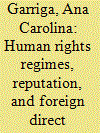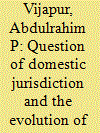| Srl | Item |
| 1 |
ID:
146191


|
|
|
|
|
| Summary/Abstract |
What are the effects of international human-rights regimes on foreign direct investment (FDI)? Existing scholarship generally suggests a negative relationship between human-rights violations and FDI. Furthermore, research shows that international regimes can have effects on third parties such as non-member countries and other nonstate actors. However, it remains unclear how a country’s participation in human-rights regimes could affect investors’ decisions. I argue that host country participation in human-rights regimes provides a “reputational umbrella” for investors and therefore positively affects FDI. This effect proves stronger in countries with poor human rights records. Interestingly, investors appear not to punish human-rights violations if the state is a party to many human-rights regimes. Empirical analyses on a sample of 135 developing countries, from 1982 to 2011, provide support for the existence of these direct and indirect effects. The findings help to disentangle reputational effects from other possible causal mechanisms. Results are robust to various model specifications, including tests for endogeneity and reverse causality.
|
|
|
|
|
|
|
|
|
|
|
|
|
|
|
|
| 2 |
ID:
113254


|
|
|
|
|
| Publication |
2010.
|
| Summary/Abstract |
One important area of UN activity, where innumerable claims to and denials of the applicability of domestic jurisdiction clause have been made, is the question of promotion and protection of human rights. The lack of a clear definition and the ambiguity of these 'terms' had a major impact on the functioning of the UN organs, especially with respect to promoting and protecting human rights. Whenever a state is accused of violating the human rights of its citizens, it generally resorts to Article 2(7) claiming that the matter was not subject to UN jurisdiction. Although both scholars and the government representatives in UN debates have differed on the question of primacy of international over domestic jurisdiction, the overwhelming opinion has shifted in favour of acknowledging the weight of international jurisdiction as evolved through the functioning of various legal instruments and regimes of the UN. This does not imply that the UN's expanded jurisdiction has replaced state jurisdiction. Indeed, the incorporation of many principles/provisions in UN human rights treaties is aimed at protecting the sovereignty of states. The institutionalized monitoring process of international human rights norms shows that virtually all states at present are subject to some international legal obligations as regards the human rights of their citizens.
|
|
|
|
|
|
|
|
|
|
|
|
|
|
|
|